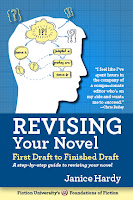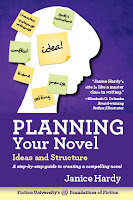This morning, I finished the first draft of the second book in my YA fantasy trilogy, The Healing Wars. (whoohoo, go me). This is cause for celebration, because writing 76,000 words of anything deserves a pat on the back. The dancing is short lived, however, because now it's time to revise.
Every writer has their own editing style, just like they have their own writing style. I like to throw down a rough draft of a chapter to see how the story shakes out. Then I go back and flesh it out, layering in details, providing internalization and adding the emotional layers that give that narrative oompf. Then I move on to the next chapter. Because of this, my first drafts tend to be fairly solid. They're far from ready though, and there's still a lot to be done before they can be sent to my editor (or sent to agents if you're querying).
I work with two fantastic critique groups. One is a "crit as you go" group that reads and critiques works in progress. So as I write, I get feedback quickly. This helps me knock out the obvious problems and get the basic ideas down. (Another reason my first drafts are pretty clean). This group is great at looking at smaller chunks of the story over a longer period of time, so they can judge what they see in front of them based on what's in the text, not what they remember from the last chapter. It's also easier to spot boggy scenes that aren't grabbing as they should, or things that aren't as clear as they could be.
Now that my first draft is done (and I've done the edits those folks have given me), I'll go back and re-read the entire story from page one, looking for anything that jumps out at me and adding what's missing. I have some notes on things I know for sure need to be addressed (like one secondary character who needs a stronger story arc) and I'll be looking for places to fix those known problems. Since I now know how the entire idea plays out, I also look for places to deepen the conflicts, raise the stakes, and eliminate the subplots that didn't go anywhere, or went off on a tangent until I figured out what to do with them. It's also a good time to see what themes developed and where I can strengthen those themes.
When this is done, I'll have my second draft. That draft goes to my second crit group.
This group is a "here's the whole thing" group. They take a much closer look at the story as a whole because they read it over a shorter period of time (usually three weeks). They're really good at spotting character arc problems and premise problems, as well as continuity issues. They also look for awkward writing and typos.
When they're done, I'll take their feedback and revise accordingly. This usually means clarifying things I felt were obvious, but weren't, tweaking the pacing to eliminate slow areas, adding more (or less) details to flesh out setting, and even changing the plot if something isn't working.
This will bring me to my third draft. Usually, the book is in good shape by now and I can move on to polishing, but sometimes problems were found that require more revisions. If it needs more work, I start back at page one and fix whatever isn't working. If it's good to go, I start the fine tooth combing.
We all have words we like to use a lot, so I start by doing a find/replace and bold-red certain words I know I'll have too many of. "Just, only, still, even," are some of my most common ones. I go to each one and see if it really is the best word or if I can cut it. Next, I'll do an adverb hunt, using find to take me to all those -ly words. I cut out and rework the ones I don't need. (And yes, you can have adverbs, It's okay, really). I tend to use a lot of exclamation points, so I do a check for those to make sure I haven't gone !!! crazy. Last thing I check are common phrases to my world and make sure I haven't over done those. (My agent had me remove half of my "Saints and sinners!" swear in my first book. I had scads of them!) Then comes the "to be" verb search. Those passive verbs can sneak in there without you realizing it, and most can be rewritten...um...you can rewrite most of them with stronger verbs.
By this time, the book is close to being ready. I do one last read through to make sure everything flows well and there isn't any revision smudge -- those little mistakes that always seem to get left behind when you edit. I'll tweak here and there as I go, but it's mostly style at this point.
Then I send it off to my editor so she can read it and tell me all the things she saw that can make it better. And I start the process all over again.
(And yes, this is a good thing. Love your editors and send them chocolate. They deserve it.)
 Looking for tips on revising your novel? Check out my book Revising Your Novel: First Draft to Finished Draft,
a series of self-guided workshops that help you revise your manuscript
into a finished novel. Still working on your idea? Then try my
just-released Planning Your Novel Workbook.
Looking for tips on revising your novel? Check out my book Revising Your Novel: First Draft to Finished Draft,
a series of self-guided workshops that help you revise your manuscript
into a finished novel. Still working on your idea? Then try my
just-released Planning Your Novel Workbook.  A
long-time fantasy reader, Janice Hardy always wondered about the
darker side of healing. For her fantasy trilogy The Healing Wars, she
tapped into her own dark side to create a world where healing was
dangerous, and those with the best intentions often made the worst
choices. Her novels include The Shifter, Blue Fire, and Darkfall from Balzer+Bray/Harper Collins. The Shifter,
was chosen for the 2014 list of "Ten Books All Young Georgians Should
Read" from the Georgia Center for the Book. It was also shortlisted for
the Waterstones Children's Book Prize, and The Truman Award in 2011.
A
long-time fantasy reader, Janice Hardy always wondered about the
darker side of healing. For her fantasy trilogy The Healing Wars, she
tapped into her own dark side to create a world where healing was
dangerous, and those with the best intentions often made the worst
choices. Her novels include The Shifter, Blue Fire, and Darkfall from Balzer+Bray/Harper Collins. The Shifter,
was chosen for the 2014 list of "Ten Books All Young Georgians Should
Read" from the Georgia Center for the Book. It was also shortlisted for
the Waterstones Children's Book Prize, and The Truman Award in 2011.  Janice is also the founder of Fiction
University, a site dedicated to helping writers improve their craft.
Her popular Foundations of Fiction series includes Planning Your Novel: Ideas and Structure, a self-guided workshop for planning or revising a novel, the companion Planning Your Novel Workbook, Revising Your Novel: First Draft to Finished Draft, and the upcoming Understanding Show Don't Tell (And Really Getting It).
Janice is also the founder of Fiction
University, a site dedicated to helping writers improve their craft.
Her popular Foundations of Fiction series includes Planning Your Novel: Ideas and Structure, a self-guided workshop for planning or revising a novel, the companion Planning Your Novel Workbook, Revising Your Novel: First Draft to Finished Draft, and the upcoming Understanding Show Don't Tell (And Really Getting It). Website | Facebook | Twitter | Goodreads | Amazon | Barnes & Noble | iTunes | Indie Bound

No comments:
Post a Comment